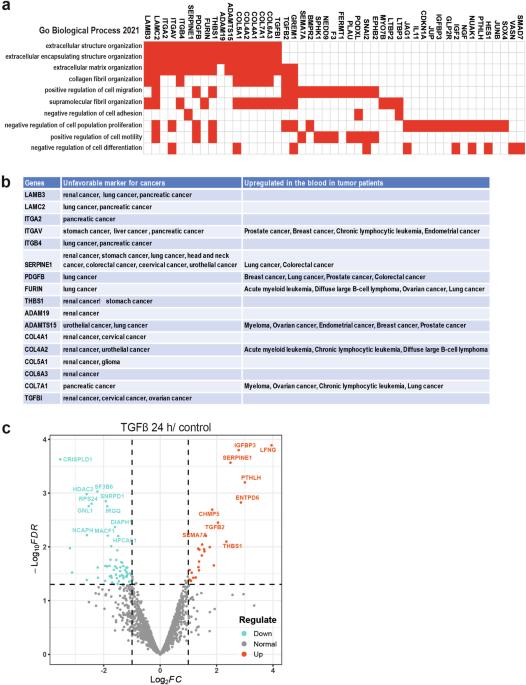The TβRI promotes migration and metastasis through thrombospondin 1 and ITGAV in prostate cancer cells
IF 6.9
1区 医学
Q1 BIOCHEMISTRY & MOLECULAR BIOLOGY
引用次数: 0
Abstract
TGFβ potently modifies the extracellular matrix (ECM), which is thought to favor tumor cell invasion. However, the mechanism whereby the cancer cells employ the ECM proteins to facilitate their motility is largely unknown. In this study we used RNA-seq and proteomic analysis to examine the proteins secreted by castration-resistant prostate cancer (CRPC) cells upon TGFβ treatment and found that thrombospondin 1 (THBS1) was observed to be one of the predominant proteins. The CRISPR Cas9, or siRNA techniques was used to downregulate TGFβ type I receptor (TβRI) to interfere with TGFβ signaling in various cancer cells in vitro. The interaction of ECM proteins with the TβRI in the migratory prostate cancer cells in response to TGFβ1 was demonstrated by several different techniques to reveal that THBS1 mediates cell migration by interacting with integrin subunit alpha V (ITGAV) and TβRI. Deletion of TβRI or THBS1 in cancer cells prevented their migration and invasion. THBS1 belongs to a group of tumorigenic ECM proteins induced via TGFβ signaling in CRPC cells, and high expression of THBS1 in human prostate cancer tissues correlated with the degree of malignancy. TGFβ-induced production of THBS1 through TβRI facilitates the invasion and metastasis of CRPC cells as shown in vivo xenograft animal experiments.

TβRI 通过凝血酶原 1 和 ITGAV 促进前列腺癌细胞的迁移和转移。
TGFβ 能有效改变细胞外基质(ECM),这被认为有利于肿瘤细胞的侵袭。然而,癌细胞利用 ECM 蛋白促进其运动的机制在很大程度上还不清楚。在这项研究中,我们利用 RNA-seq 和蛋白质组分析来研究耐阉割前列腺癌(CRPC)细胞在 TGFβ 处理后分泌的蛋白质,结果发现血栓软骨素 1(THBS1)是主要的蛋白质之一。利用CRISPR Cas9或siRNA技术下调TGFβ I型受体(TβRI),干扰体外各种癌细胞的TGFβ信号传导。通过几种不同的技术证明了前列腺癌迁移细胞中的 ECM 蛋白与 TGFβ1 的 TβRI 相互作用,从而揭示了 THBS1 通过与整合素亚基αV(ITGAV)和 TβRI 相互作用来介导细胞迁移。在癌细胞中删除 TβRI 或 THBS1 可阻止其迁移和侵袭。THBS1属于一组通过TGFβ信号在CRPC细胞中诱导的致瘤ECM蛋白,THBS1在人类前列腺癌组织中的高表达与恶性程度相关。体内异种移植动物实验表明,TGFβ通过TβRI诱导产生的THBS1促进了CRPC细胞的侵袭和转移。
本文章由计算机程序翻译,如有差异,请以英文原文为准。
求助全文
约1分钟内获得全文
求助全文
来源期刊

Oncogene
医学-生化与分子生物学
CiteScore
15.30
自引率
1.20%
发文量
404
审稿时长
1 months
期刊介绍:
Oncogene is dedicated to advancing our understanding of cancer processes through the publication of exceptional research. The journal seeks to disseminate work that challenges conventional theories and contributes to establishing new paradigms in the etio-pathogenesis, diagnosis, treatment, or prevention of cancers. Emphasis is placed on research shedding light on processes driving metastatic spread and providing crucial insights into cancer biology beyond existing knowledge.
Areas covered include the cellular and molecular biology of cancer, resistance to cancer therapies, and the development of improved approaches to enhance survival. Oncogene spans the spectrum of cancer biology, from fundamental and theoretical work to translational, applied, and clinical research, including early and late Phase clinical trials, particularly those with biologic and translational endpoints.
 求助内容:
求助内容: 应助结果提醒方式:
应助结果提醒方式:


